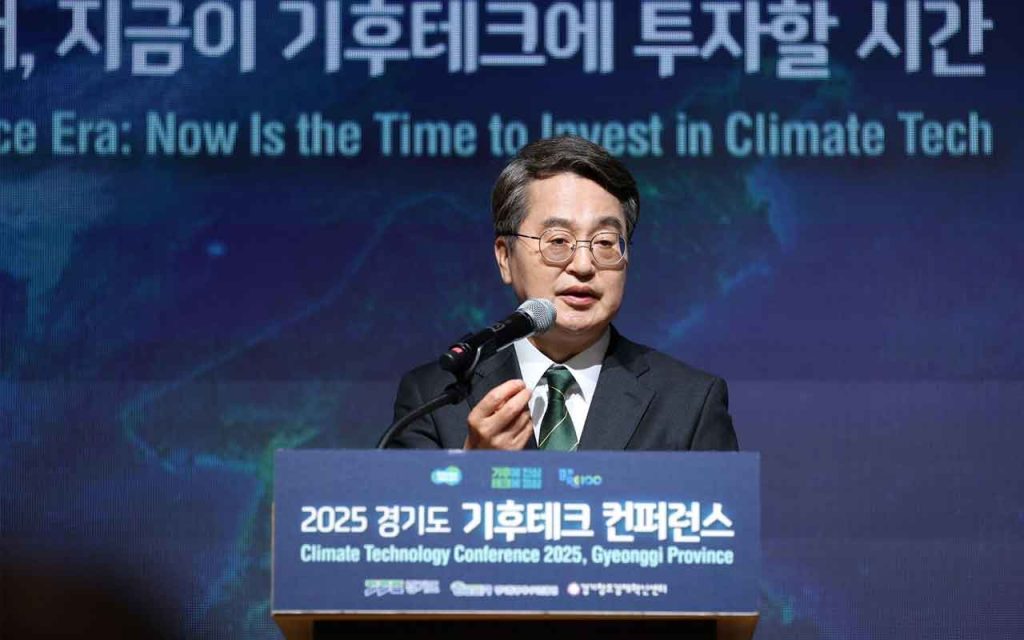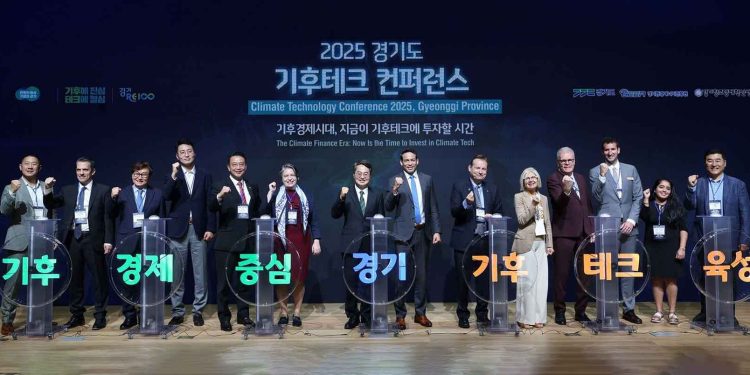The race toward a net-zero economy is accelerating in South Korea, and Gyeonggi Province is taking the lead. By unveiling a plan to foster three climate-tech unicorns by 2030, the province is signaling a bold shift in how Korea links innovation with sustainability — positioning itself as the nation’s testing ground for green growth, impact investment, and global climate-tech competitiveness.
Gyeonggi Province Launches Ambitious Climate-Tech Vision
Gyeonggi Province has unveiled a comprehensive plan to foster three climate-tech unicorn companies by 2030, positioning climate innovation as a new growth pillar in Korea’s regional economy.
Governor Kim Dong-yeon announced the “Three Major Climate-Tech Visions” on October 24 at the 2025 Gyeonggi Climate-Tech Conference in Suwon, laying out a multi-stage roadmap to grow 100 startups by 2026, 20 scale-ups by 2028, and three unicorns by 2030.
The initiative centers on three pillars:
- Establishing a Climate-Tech Cluster in the Northern Gyeonggi Peace Economic Zone;
- Creating a Climate-Tech Fund to invest in promising companies;
- Launching a Gyeonggi Climate-Tech Center to serve as the province’s central control tower for climate innovation.
Climate-Tech as Korea’s Next Economic Driver
The new strategy reflects growing recognition that climate technology — which integrates clean energy, carbon reduction, and sustainable industrial innovation — is emerging as a key frontier for Korea’s startup ecosystem.
Firstly, the Climate-Tech Cluster will function as a forward base for research, commercialization, and technology transfer, linking public R&D institutions with private enterprises. The province aims to build a regional climate economy model that drives synergy between green technology and local industry.
Secondly, the Climate-Tech Fund will mobilize capital from both public and private sectors to back high-potential startups, ensuring that firms with viable green solutions receive the resources needed to scale globally.
Meanwhile, the Gyeonggi Climate-Tech Center, to be operated in partnership with the Gyeonggi Environment and Energy Promotion Agency, will coordinate provincial programs, facilitate demonstration projects, and expand community-based initiatives such as Climate Living Labs — enabling residents to directly test and adopt climate innovations.
Inside the New Climate-Tech Alliance Powering Gyeonggi’s Vision
Governor Kim Dong-yeon emphasized that addressing the climate crisis is no longer optional but an “urgent matter of survival,” saying:
“The goal of the Three Major Climate-Tech Visions is to create a climate-tech playground where companies can freely challenge themselves and grow. Gyeonggi Province will cultivate 100 startups by 2026, 20 scale-ups by 2028, and three unicorns by 2030.”

The conference also marked the official launch of the Gyeonggi Climate-Tech Alliance, a cross-sector collaboration involving 20 key institutions — including the Gyeonggi SMEs and Startups Office, KOTRA, KOICA, Kakao Mobility, KT, Kiwoom Investment, Sopoong Ventures, and D3 Jubilee Partners.
The alliance will operate Investment and Cluster Divisions to coordinate funding pipelines, regulatory feedback, and policy recommendations. Participating corporations will connect climate-tech startups with open innovation and proof-of-concept (PoC) opportunities, while venture investors will offer strategic capital and mentorship to accelerate scaling.
Five provincial startups — APGREEN, PM Energy Solution, Trimass ((주)트라이매스), DEEPLANT, and MoveAWheeL — have also joined as founding members, representing emerging verticals across clean tech, carbon tech, food tech, and geo tech.
Gyeonggi’s Vision and Korea’s Place in the Global Green Economy
Gyeonggi’s plan highlights how Korean regional governments are beginning to act as innovation laboratories for national climate policy. By integrating R&D clusters, financial instruments, and cross-sector partnerships, the province aims to turn climate response into economic opportunity — aligning with Korea’s broader shift toward a climate economy.
The public–private alliance model mirrors global practices in markets like Europe and Japan, where local ecosystems serve as testbeds for green technologies before scaling internationally. For investors, the combination of policy-backed funding and corporate collaboration signals a maturing climate-tech environment capable of supporting late-stage ventures.
Governor Kim described the initiative as part of a long-term strategy to turn Gyeonggi into a “leading region for climate-driven innovation,” reinforcing Korea’s competitiveness in the Asia-Pacific green economy.
Can Korea Turn Climate Innovation into Its Next Growth Engine?
Gyeonggi’s climate-tech roadmap underscores a broader transformation underway in Korea’s startup landscape — one where climate technology is not just a policy theme but an industrial growth strategy.
The success of the province’s “Three Major Climate-Tech Visions” will depend on sustained funding, regulatory coordination, and measurable outcomes. If realized, it could position Korea as a regional hub for impact-driven innovation, linking ESG capital with scalable, data-driven climate solutions.
In the governor’s words, the new agenda represents “a commitment to turn the climate crisis into Korea’s next economic opportunity” — and potentially, the country’s blueprint for green unicorn creation in Asia’s fast-evolving climate economy.
🤝 Looking to connect with verified Korean companies building globally?
Explore curated company profiles and request direct introductions through beSUCCESS Connect.
– Stay Ahead in Korea’s Startup Scene –
Get real-time insights, funding updates, and policy shifts shaping Korea’s innovation ecosystem.
➡️ Follow KoreaTechDesk on LinkedIn, X (Twitter), Threads, Bluesky, Telegram, Facebook, and WhatsApp Channel.





